Chadbourn Gets Historical
Author Mark Chabourn is planning a series of posts on writing historical fantasy. The first one is here. It looks like it could be an interesting series.
Cheryl Morgan's Fanzine
Author Mark Chabourn is planning a series of posts on writing historical fantasy. The first one is here. It looks like it could be an interesting series.
Colin Harvey will be editing a new anthology for the Irish company, Aeon Press. Transtories will be “a collection of original stories based on, developed from or including any word from the dictionary prefixed by ‘trans;’”. The submission period begins on March 1st and closes on March 31st. Full details at the Aeon website.
Today’s Guardian Book Blog features a post by Damien G. Walter in which he implores readers not to be put off by the gaudy, and sometimes frankly awful, covers used on speculative fiction books. Examples of fine writers he says can be found behind lurid covers include JG Ballard, Kim Newman and Jon Courtenay Grimwood. (It sounds like some smart person has got ARCs of The Fallen Blade to several Guardian Book Blog contributors.)
Jeff VanderMeer is one of those writers who loves to have a soundtrack to his writing. Today the music blog, Largehearted Boy, has a feature by Jeff in which he talks about the musical inspiration for his collection, The Third Bear.
The boss of PS Publishing is making a new foray into writing with the Forever Twilight trilogy of “apocalyptic science fiction novels”. Yes, that’s during the apocalypse, not post-it. Angry Robot books has signed him up. More details from their website.


This is issue #5 of Salon Futura. We have a lot of great content for you again. Please do check out the New In Store column where we have two great new small presses to welcome and a charity fund raiser for Queensland Flood Relief.
» Read more

Cheryl Morgan looks at some of the debut writers from last year.
» Read more

Cheryl Morgan makes the case for genre as a process rather than a category.
» Read more

This month on The Salon Cheryl Morgan and her guests discuss which 2010 graphic stories might be good candidates for the Hugo Award. With Cheryl in The Salon are writer Maura McHugh, retailer and blogger Joe Gordon, and podcaster David Monteith.
» Read more

Cheryl Morgan talks to Paul Cornell in the bar at BristolCon 2010 where Paul was one of the Guests of Honour.
» Read more

Cheryl Morgan talks to Judith Clute at her home in North London.
» Read more
We have an embarrassment of riches arriving in the store this month. I’d say that I don’t know where to start, except that this one is important.
» Read more
It has been a busy month. Yes, I know there were supposed to be holidays, but it has been all go around here.
» Read more
When he was researching his review of Johanna Sinisalo’s Birdbrain, Sam Jordison discovered that Joseph Conrad had co-authored a science fiction novel with Ford Madox Ford. Sam was intrigued, and tracked down the book, The Inheritors. His review of it has just gone up at The Guardian.
Our sister site, SF Awards Watch, has just reported that Paolo Bacigalupi’s Ship Breaker has won the prestigious Printz Award from the American Library Association. Further details here.
In the latest episode of the wonderful “Live with Gary K. Wolfe!” podcast, Jonathan Strahan and Gary K. Wolfe talk about what they are looking for in writing about books. If you want to know the sort of thing that I’m looking for as regards submissions to Salon Futura, go and listen to them. They have nailed it.
Orbit UK has emailed us with a link to their 2011 catalogue. You can find it here (along with Little Brown’s other imprints). Highlights for me include Jon Courtenay Grimwood’s venture into vampire-ridden Venice, a new fantasy series from Daniel Abraham, and Deadline, the sequel to Mira Grant’s wonderful FEED. It is also good to see them picking up authors from the other side of the world such as Helen Lowe and Trent Jamieson. Orbit’s operation is fairly international these days, so there’s a good chance you’ll be seeing all of these books in North America as well.

Cheryl Morgan looks at fantasy written by women.
» Read more

This month in The Salon we discuss whether steampunk is necessarily all about empire. The guests are Karin Lowachee (from Canada via Guyana), Lavie Tidar (from Israel) and Jeff VanderMeer (co-editor of two steampunk anthologies and other steampunk-related books).
» Read more

Cheryl Morgan talks to Alastair Reynolds in a hotel room during BristolCon 2010. Al talks about his books, the future of space flight, the lack of women science fiction writers, and how events such as RaceFail have influenced his work.
» Read more

Cheryl Morgan talks to Juliet E. McKenna in a hotel room at BristolCon 2010. Juliet talks about her own novels, and about how to promote UK writers in a time of savage cutbacks in arts funding. Immediately after this interview Juliet and John Meaney did a wonderful panel on writing fight scenes, much of which involved doing violence to their brave volunteer victim, Joe Abercrombie.
» Read more
Tom Hunter, the current Clarke Award Administrator, has published an open letter on the Torque Control blog asking for feedback on the future of the award. You can add your comments here.

Lots has been happening on the bookstore front since last issue. We now have a proper bookstore which is gradually filling up with interesting material. Right now it is fairly limited, but I am busy talking to a number of small presses about offering their books. I talked quite a bit about my philosophy for the store on my blog, in particular the donations system. There’s a whole brave new world of publishing being opened up by the advent of ebooks. It will be fascinating to see what comes of it, but whatever happens we do need to find ways in which writers can make money from what they do.
So what do we have in the store?
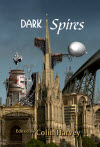 Obviously there is Dark Spires. While the paper books are selling reasonably well in the UK, I didn’t expect to get orders from overseas. The postage adds significantly to the price. But you can buy ebook editions, and at current exchange rates it is under US$5. Of course you can buy the book anywhere in the world. There’s no DRM, and no region restrictions. I expect this to apply to everything we sell.
Obviously there is Dark Spires. While the paper books are selling reasonably well in the UK, I didn’t expect to get orders from overseas. The postage adds significantly to the price. But you can buy ebook editions, and at current exchange rates it is under US$5. Of course you can buy the book anywhere in the world. There’s no DRM, and no region restrictions. I expect this to apply to everything we sell.
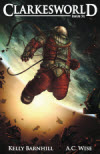 In addition you can buy ebook editions of Salon Futura and Clarkesworld. Yes, these are available for free on their respective web sites, but the ebook editions are very cheap, and if you buy them it helps Neil and I keep our magazines going. I expect to be adding other magazines soon.
In addition you can buy ebook editions of Salon Futura and Clarkesworld. Yes, these are available for free on their respective web sites, but the ebook editions are very cheap, and if you buy them it helps Neil and I keep our magazines going. I expect to be adding other magazines soon.
New for December I’m delighted to announce that we have started to stock some ebooks published by Lethe Press. Lethe is an American-based small press specializing in books of interest to the LGBT community. Many of their books are science fiction and fantasy, and they also publish Icarus, “The Magazine of Gay Speculative Fiction.”
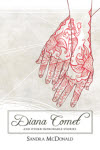 First up in our list of books from Lethe is Diana Comet and Other Improbable Stories, a collection by Sandra McDonald. Many of you will remember the fabulous “periodic table” promotional video that McDonald created for the book, celebrating other female science fiction writers. You may also have read some of her recent short fiction, such as “Seven Sexy Cowboy Robots” at Strange Horizons, or “Beach Blanket Spaceship” at Clarkesworld. If you like those examples of McDonald’s style of humorous, inventive, LGBT-themed fiction them you will love Diana Comet as well.
First up in our list of books from Lethe is Diana Comet and Other Improbable Stories, a collection by Sandra McDonald. Many of you will remember the fabulous “periodic table” promotional video that McDonald created for the book, celebrating other female science fiction writers. You may also have read some of her recent short fiction, such as “Seven Sexy Cowboy Robots” at Strange Horizons, or “Beach Blanket Spaceship” at Clarkesworld. If you like those examples of McDonald’s style of humorous, inventive, LGBT-themed fiction them you will love Diana Comet as well.
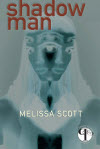 A much older book is Meslissa Scott’s Shadow Man. This is one of those books that always comes up when people talk about gender-themed science fiction. Set at a time when humanity has developed five distinct genders, the novel explores themes of gender and sexual identity. The book won the 1996 Lambda Award in the Science Fiction and Fantasy category (tied with Nicola Griffith’s equally superb Slow River).
A much older book is Meslissa Scott’s Shadow Man. This is one of those books that always comes up when people talk about gender-themed science fiction. Set at a time when humanity has developed five distinct genders, the novel explores themes of gender and sexual identity. The book won the 1996 Lambda Award in the Science Fiction and Fantasy category (tied with Nicola Griffith’s equally superb Slow River).
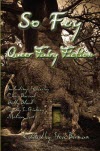 Back with short fiction, we have So Fey: Queer Fairy Fictions. This is an anthology with the tongue-in-cheek theme of fairy stories with LGBT themes. Contributors include Rick Bowes, Sarah Monette, Holly Black, Laurie J. Marks, Christopher Barzack, Delia Sherman, Melissa Scott and Eugie Foster. The book is edited by Lethe’s founder, Steve Berman.
Back with short fiction, we have So Fey: Queer Fairy Fictions. This is an anthology with the tongue-in-cheek theme of fairy stories with LGBT themes. Contributors include Rick Bowes, Sarah Monette, Holly Black, Laurie J. Marks, Christopher Barzack, Delia Sherman, Melissa Scott and Eugie Foster. The book is edited by Lethe’s founder, Steve Berman.
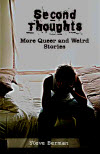 Finally we have Second Thoughts: More Queer and Weird Stories, a collection of stories by Steve Berman himself. The title pretty much explains what it is all about, except for the “second” bit which refers to the fact that this is Steve’s second collection.
Finally we have Second Thoughts: More Queer and Weird Stories, a collection of stories by Steve Berman himself. The title pretty much explains what it is all about, except for the “second” bit which refers to the fact that this is Steve’s second collection.
As explained last issue, we’ve taken a slightly longer gap between issues this time in order to drift towards a mid-month release date. That way we are not competing for attention with the various other magazines (including Clarkesworld) that come out at the beginning of the month. Also it means I don’t have to worry about producing a magazine in the middle of the holidays.
For this issue I’m delighted to welcome Alvaro Zinos-Amaro as a guest contributor. We have some interviews recorded at BristolCon, a podcast about steampunk, and the usual fine contributions from Karen, Sam and Jonathan. Simon Breeze’s cover was also picked up at BristolCon, where it was in the art show.
Probably the most important thing about this issue is that we now have a proper online shop up and running, which we are starting to stock with material from a range of small presses. Please check out the “New In Store” column to see what is happening on that front. I am absolutely delighted to be selling Sandra McDonald’s Diana Comet anthology.
Our next issue will be rather more art-themed. We have an interview with Paul Cornell about comics, and one with Judith Clute about her art. The podcast, assuming I can get a good group together, will also be about comics. Jonathan is working on an article on steampunk in Japan, though I’m not sure when that will be ready, and my own column will focus on writers who are new in 2010. Have a wonderful holiday season, and we’ll see you in January.
Today’s Guardian contains a round up of the favorite books of 2010 by a variety of the newspaper’s regular contributors. Our own Sam Jordison picked Birdbrain, by Finnish author Johanna Sinisalo. You’ll find out why when our issue #4 goes online. Meanwhile the paper’s SF reviewer, Eric Brown, picked Horns by Joe Hill, and blogger Damien G. Walter picked Kraken by China Miéville.
Our short fiction reviewer, Karen Burnham, is about to take up a prestigious new post as editor of the Locus Roundtable blog. The official announcement is here. We look forward to seeing what she does with the blog.
Locus magazine has announced that, as of January 2011, it will be available in ebook format. The launch will be accompanied by a “Digital Age” special issue that includes contributions from many people involved in online publishing, including me.
The weekly podcast discussions between Jonathan Strahan and Gary K. Wolfe are one of the highlights of my weekends. This week’s episode was even more special: both in general, because John Clute was a guest contributor, and for me personally as I also got to participate. You can listen to the podcast here, and I talk a bit about some of the ideas we discussed here.
Tor, one of the most prolific publishers of science fiction in the world, has recently released a new catalog covering the period Spring/Summer 2011. You can find it online here (pdf).
If covers are anything to go by, they expect great things from the US release in May of The Quantum Thief by Hannu Rajaniemi. In the UK Gollancz has just ordered a 5th reprint of the trade paperback edition, which is certainly a good indication of likely strong sales elsewhere.
Aside from that there is a strong streak of sequelitis amongst the high profile releases. Possibly the most significant announcement is that of the October release of The Children of the Sky by Vernor Vinge. This is a sequel to the Hugo-winning A Fire Upon the Deep, which Tor are re-issuing in August.
Still in Hugo territory, Robert Charles Wilson’s Vortex, the third and final part of the series begun with Spin and Axis, is due out in July.
Other notable sequels include This Shared Dream (July) by Kathleen Ann Goonan, a follow-up to In War Times; and The Tempering of Men (August) by Sarah Monette and Elizabeth Bear, a follow-up to A Companion to Wolves.
The final announcement that caught our eye is that in August Tor will be re-issuing John Brunner’s classic tale of an overpopulated world, Stand on Zanzibar. The book won the Hugo in 1969 and has lost little of its relevance since. Now if only Tor would also re-issue The Sheep Look Up…
The Guardian is continuing to dip its toes into the waters of speculative fiction, with mixed degrees of success. Discussions of SF in the mainstream media are often most interesting for the ways in which the commentators limit their view of it so as to be able to dismiss it as bad.
Margaret Atwood famously described science fiction as being about “talking squid in space”, though she has apparently now added “flying rabbits” to her definition. She does this in order to attempt to distance what she regards as the believable speculation of her novels, particularly Oryx and Crake and The Year of the Flood, from less rigorous scientific extrapolation in what she believes science fiction to be.
In The Guardian‘s latest podcast Simon Ings responds to Damien Walter by arguing that science fiction is nothing but rigorous scientific extrapolation, devoid of all emotional content.
The apparent contradiction between these two explanations as to why science fiction is bad does not yet appear to have been noticed by anyone at The Guardian.
It is turning out to be a bad year for anime creators. Jonathan Clements has an obituary for Umanosuke Iida over at Schoolgirl Milky Crisis.
Orbit UK has announced a couple of staff changes. Anne Clarke becomes editorial director (replacing Darren Nash who moved to Gollancz a few weeks ago). In addition James Long, author of the Speculative Horizons blog, has been taken on as an editorial assistant.
The big news, however, is that Jo Fletcher has left Gollancz after 16 years to start a brand new SF&F list at Quercus. In her time at Gollancz Fletcher has worked with authors such as Sir Terry Pratchett, Sir Arthur C. Clarke and Ursula Le Guin. The new Quercus imprint will be known as Jo Fletcher Books. We look forward to it.
Seanan McGuire, whom we interviewed for our current issue, has announced on her LiveJournal the sale of a new series of books to DAW. They are about a, “family of cryptozoologists”. Weird animals are out there, it appears, and McGuire knows where they are hiding.
Well yes, they are dead. But the very wonderful Science Fiction Oral History Association has a fine collection of recordings, and now they have a podcast too. The first episode of The Space Dog Podcast features a recording from 1976. It was made for Ballantine Science Fiction Hour, which may have been a radio show but may just have been put out on vinyl. Ballantine Books were obviously using it to promote their authors in much the same way as websites like Tor.com do with modern technology. The first half of the show is an interview with Sir Arthur C. Clarke. The second half is a discussion panel in which Isaac Asimov, Lester del Rey, Frederik Pohl, and Gordon R. Dickson discuss Clarke and much else besides. Highlights include Clarke expressing his admiration for Olaf Stapledon, Asimov explaining why he wants to be remembered for alien sex, and Pohl noting that he has a new book due out called Gateway that he thinks may be his best work to date.
Our columnist, Sam Jordison, has a new post up at the Guardian Book Blog. It is the latest in his series looking at past Hugo winners. This time he tackles To Your Scattered Bodies Go by Philip José Farmer.
Here’s a blog that may be of interest to many of you. It is called Bookmarketology, and it is run by Darren Turpin who is the Digital Marketing Manager for Little, Brown Book Group (UK). The purpose of the blog is to give practical advice on online promotion and marketing for published authors. Darren has been around the industry for a long time and knows his stuff.
Author and publisher Chris Roberson has announced on Twitter that he will be writing for DC’s Superman comic. With Paul Cornell already in charge of Action Comics, and about to get a stint on Batman and Robin, the science fiction community is starting to get serious traction in the comics world.
Roberson is no stranger to comics. He is already scripting Cinderella (a Fables spin-off) for Vertigo and Dust to Dust, a prequel to Do Androids Dream Electric Sheep, for Boom! Studios.
Update: Yes, we forgot iZombie (also from Vertigo), which is a really wonderful comic.
Today the BBC’s Woman’s Hour programme included a lengthy interview with Margaret Atwood about her novel, The Handmaid’s Tale, which was published 25 years ago. Presenter Jenni Murray and guest critic Alex Clark discuss the novel with Atwood, and examine its relevance in a world increasingly plagued by religious fundamentalism.
Of interest to our readers will be the fact that Clark very clearly describes the book as “science fiction”. Rather than dispute this, Atwood acknowledges that she was working in a tradition whose founding texts included Huxley’s Brave New World and Orwell’s 1984, which by inference are presumably also science fiction.
The programme is available here via the BBC iPlayer. The interview with Atwood takes up the first 20 minutes or so of the show.
Via Jeff VanderMeer we learn that Amazon.com has awarded a $15,000 grant to Shared Worlds, the SF&F writing camp for teenagers. Jeff has the full press release on his website.